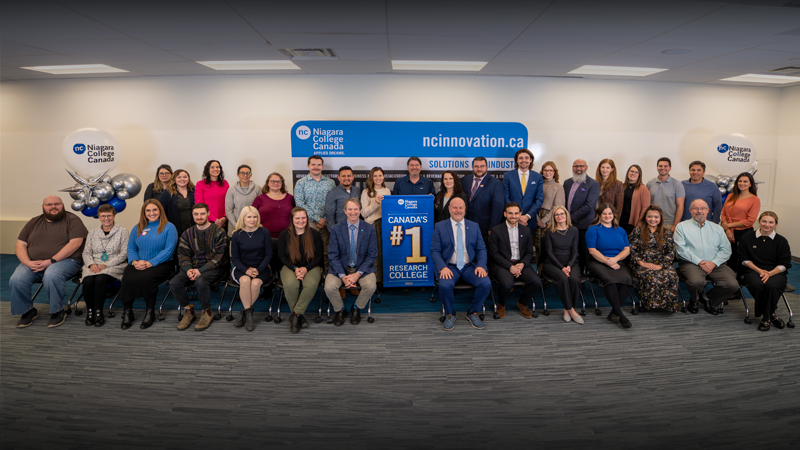In this edition:
- Niagara College named No. 1 research college in Canada in latest top-50 research colleges report
- ServiceOntario to open new centres in Staples stores
- Free info sessions on Canada Summer Jobs Wage Subsidy available
- Canada revises cost-of-living requirements for international students
- Over 140,000 new workers needed for Canada’s food and beverage manufacturing industry by 2030
- Ontario Chamber releases new policy brief on low-carbon fleets
- Canadian Chamber says Oil and Gas Emissions Cap does not adequately consider industry
- Non-residential building construction leads October construction gains
- Robert Half says more than half of Cdn. companies plan to hire more in the first half of 2024
- Niagara winery owners, winemaker purchase sparkling wine facility
- Focus on Equity, Diversity & Inclusion
Niagara College named No. 1 research college in Canada in latest top-50 research colleges report
For the second time in less than five years, Niagara College (NC) has hit the No. 1 spot for colleges in Canada for research funding, according to a special report released today. Moving up one spot from last year’s standings, Niagara College is now the No. 1 research college across Canada. This is the ninth year in a row NC has been in the top 10.
In its special report Canada’s Innovation Leaders, Research Infosource Inc. announced the rankings based on total research funding numbers for 2022. The publication includes a national study “Canada’s Top 50 Research Colleges”.

ServiceOntario to open new centres in Staples stores
The Ontario government is making it easier and more convenient for families and businesses to access vital government services such as driver’s licences and health cards. Beginning in early 2024, ServiceOntario is opening new centres in select Staples Canada stores with additional locations expected to open throughout the year.
“ServiceOntario is a critical link in helping people access important government services,” said Todd McCarthy, Minister of Public and Business Service Delivery. “We are working to make it easier to live and work in Ontario, with in-person access as a fundamental component of excellent service delivery. That is why we are partnering with Staples Canada, an experienced retailer with a strong presence in Ontario, to help provide services where people already live, work and shop.”

Free info sessions on Canada Summer Jobs Wage Subsidy available
Employers from not-for-profit organizations and the public sector, as well as private sector organizations with 50 or fewer full-time employees, can apply for the Canada Summer Jobs (CSJ) program, which provides wage subsidies to employers to create quality summer work experiences for young people aged 15 to 30 years.
The office of Vance Badawey, M.P. will hold two free online information sessions to help guide applicants through the process on the morning of December 15th and December 18th. Anyone who would like to attend is asked to contact Ken Scholtens, Manager of Economic Development at the City of Thorold, at ken.scholtens@thorold.ca.

Canada revises cost-of-living requirements for international students
The Honourable Marc Miller, Minister of Immigration, Refugees and Citizenship, announced today that starting January 1, 2024, the cost-of-living financial requirement for study permit applicants will be raised so that international students are financially prepared for life in Canada. Moving forward, this threshold will be adjusted each year when Statistics Canada updates the low-income cut-off (LICO). LICO represents the minimum income necessary to ensure that an individual does not have to spend a greater than average portion of income on necessities.
Ontario Chamber releases new policy brief on low-carbon fleets
Transportation is the largest source of greenhouse gas emissions in Ontario. While there is a growing shift toward electric and hybrid passenger vehicles, businesses face unique challenges when it comes to transitioning their medium- and heavy-duty fleets. In an era where environmental sustainability intersects increasingly with business viability, the Ontario Chamber of Commerce (OCC) released its policy brief, “Transitioning to Low-Carbon Fleets in Ontario,” today. It addresses a timely issue facing Ontario businesses, exploring the technologies, policies, and investments required to enable low-carbon commercial fleets across the province.
Over 140,000 new workers needed for Canada’s food and beverage manufacturing industry by 2030
Food Processing Skills Canada released latest workforce forecasts and labour market information for the Canadian food and beverage manufacturing industry.
Last year, the value of Canadian food and beverage exports was estimated at $54.3B accounting for seven per cent of Canada’s total exports.
In 2022, this industry employed approximately 300,000 people and by 2030 that number is expected to grow to 325,000 — an increase of 9 per cent. However, it is important to note the context for this with Canada’s aging population. It isn’t that only 25,000 new workers are needed in the next seven years, it is that over 65,000 members of the current workforce will retire over that same period. This is in addition to the current 50,000 vacancies that the industry is experiencing.

In a statement issued today, Bryan N. Detchou, Senior Director, Natural Resources, Environment and Sustainability at the Canadian Chamber of Commerce, expressed concerns about the Government’s decision to pursue an Oil and Gas Emissions Cap without adequately considering industry concerns.
“The proposed emissions cap will make Canada uncompetitive in the fight for the global capital that actually encourages investment in net-zero technologies,” Detchou said, “some of which do not yet exist at scale in the market. We shouldn’t be the jurisdiction with the least attractive fiscal policies for decarbonization.”

Non-residential building construction leads October construction gains
The total value of building permits in Canada increased 2.3% from September to $11.2 billion in October, led by gains in the non-residential sector, Statistics Canada reported today. The total value of non-residential sector permits increased 5.3% to $4.1 billion in October, with gains being concentrated in Ontario (+16.0% to $2.0 billion). This was attributable to a significant increase in construction intentions in the institutional component (+29.2% to $1.4 billion). In October, the largest permit issued was for the construction of a new hospital wing in Toronto.

Robert Half says more than half of Cdn. companies plan to hire more in the first half of 2024
The job market will remain resilient heading into 2024, research from talent solutions and business consulting firm Robert Half shows. According to the company’s State of Hiring Survey, 54 per cent of hiring managers plan to add new permanent positions in the first six months of the year while another 40 per cent anticipate hiring for vacated positions.
Among managers who plan to expand hiring, more than six in 10 (61 per cent) cite company growth as the primary factor influencing their hiring decisions for the first half of 2024, followed by a lack of requisite skills among current employees (50 per cent). Capitalizing on top talent laid off from other companies and employee turnover were tied, with 48 per cent of hiring managers citing these as factors in their hiring plans. In addition, more than three-quarters (77 per cent) of those who had to postpone projects in 2023 said they plan to move forward with projects that were previously put on hold.
Niagara winery owners, winemaker purchase sparkling wine facility
The largest independent facility for making sparkling wine in Ontario has been jointly purchased by two of the Niagara’s key winery owners and a veteran winemaker.
Hidden Bench owner Harald Thiel, Cave Spring co-founder Len Pennachetti, and winemaker Philip Dowell acquired Millesime effective Dec. 1. The company has been renamed to the Niagara Sparkling Wine Service.
Commenting on the recent transaction, Pennachetti and Thiel said that this acquisition demonstrates their commitment to the future of traditional method sparkling wine production in Ontario. “By securing the continuity of Millesime and providing Ontario craft winemakers with a scalable traditional method, sparkling wine processing facility we believe that we can assure and propel the growth of premium sparkling wine production in our industry.”
Did you know?
Focus on Equity, Diversity & Inclusion
When blind hiring advances DEI — and when it doesn’t
Inspired by the results of the famous orchestra study — where symphony orchestras began hiring more women by having people audition from behind a screen that concealed their gender — some major organizations are now using a “blind hiring” strategy to help achieve goals related to diversity. The typical blind hiring process involves stripping information from job application materials before review that could signal applicants’ memberships in specific groups and cue discrimination. Though not yet widespread, this de-biasing strategy is gaining traction: A recent survey of over 800 U.S.-based HR practitioners indicated that about 20% worked for organizations that used blind hiring and about 60% were familiar with it.
What many practitioners may be unaware of, however, is the large span of new research on blind hiring that has been published since that orchestra study in 2000. Over the past two decades, the efficacy of blind hiring as a strategy to boost hiring outcomes for members of historically disadvantaged groups has been tested in the “field” — that is, in real hiring decisions in real organizations — in various settings across Europe, Canada, and the U.S. By understanding the results of these recent studies, decision-makers in organizations can now determine, at a very granular level, whether a blind hiring strategy is likely to help or hinder their organizations’ efforts to diversify pools of new hires.
Through the Daily Updates, the GNCC aims to deliver important business news in a timely manner. We disseminate all news and information we feel will be important to businesses. Inclusion in the Daily Update is not an endorsement by the GNCC.







